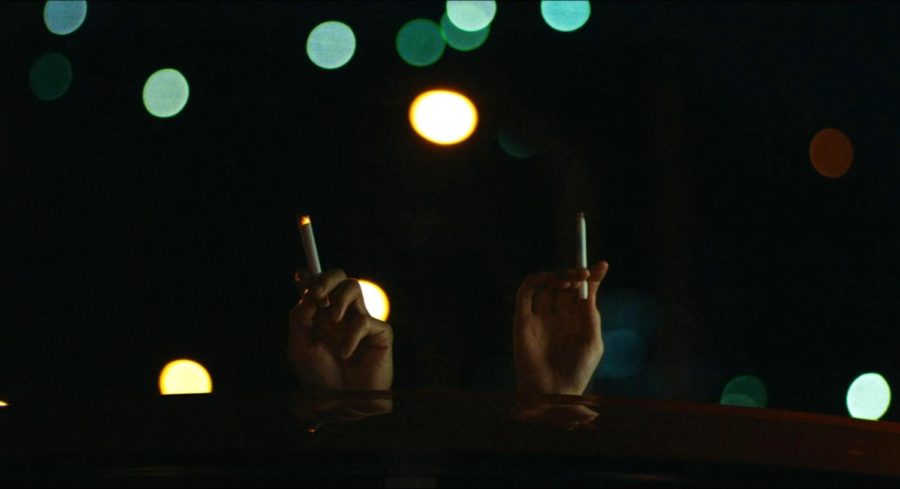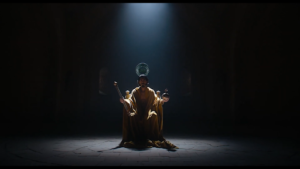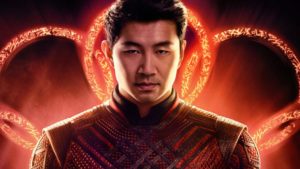Top 5+5 of 2021: Movies
Actors Hidetoshi Nishijima (on the left) and Toko Miura (on the right) hold up cigarettes in solace in “Drive My Car”. Image courtesy of Certified Kino Bot.
January 27, 2022
It’s that time of year again! I have seen many films from 2021 (although admittedly too few), and so I’ve curated this list of my five personal favorites. Note that I said PERSONAL favorites. You may not agree with some of my picks, and you may insist some are missing (I didn’t see “Spider-Man: No Way Home” (2021) and do not regret it), but this is ultimately my list, and not yours. I hope that if there’s something here you haven’t seen that you check it out!
Top 5 Movies of 2021
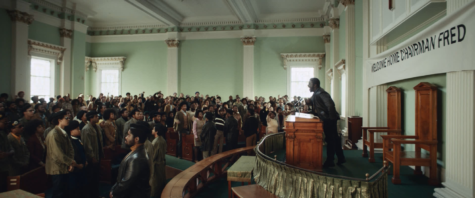
5. Judas and the Black Messiah
Director: Shaka King
Country: United States
I’ve already given many an opinion on “Judas and the Black Messiah” here and here during Oscar season, so I’ll keep this brief. Simultaneously an intense espionage thriller about an irredeemable man and an intimate character study of the person he seeks to eliminate, “Judas” manages to be extremely incisive while maintaining constant entertainment. The film’s technical prowess is impressive on its scale, and I’m extremely impressed at the amount of love going towards the Black Panther Party for a film made by a large American studio. See it.
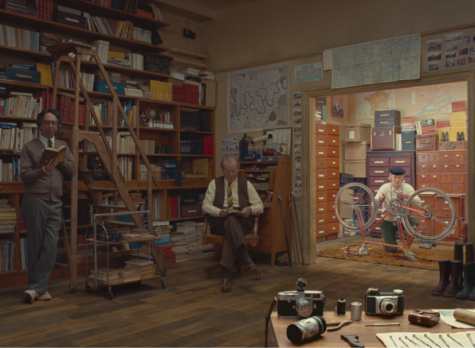
4. The French Dispatch
Director: Wes Anderson
Country: United States
If ever there was a man whose quirk had turned him into a brand, it would be Wes Anderson. Each of his films has become more and more idiosyncratic over the years, with each frame in each film getting progressively more intricately staged with an attention to detail and formal playfulness you rarely see anywhere else. “The French Dispatch” is no exception, indulging in more Andersonisms than ever before: center framing, changing aspect ratios, deadpan humor, cacophonous and pointless gunfights, and large-scale effects sequences that purposely call out their artificiality. The beauty of this film is that while many of Anderson’s films can feel emotionally hollow by virtue of their stylism, the omnibus nature of “The French Dispatch” allows it to revel in its lack of character connections to point towards pure comedy. This is by far the funniest film of the year, with so many sight gags and tricks of language that if one joke doesn’t land for you, there will surely be two more in a minute that will have you howling. Now that all semblance of emotional significance or thematic impact are gone from Anderson’s work, what’s left is a delectable multi-tier pastry. While it’s ultimately just empty calories, the experience is one of a kind, and clearly the work of a master of their craft.
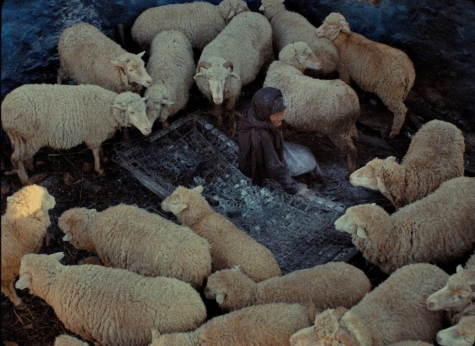
3. This is Not a Burial, It’s a Resurrection
Director: Lemohang Jeremiah Mosese
Country: Lesotho
In a timeless psychedelic dive bar off in some corner of the universe, a raspy voiced deity speaks to an unseen audience while playing what sounds like a demented pan flute. He tells a tale of a land on the precipice of so-called progress, a land outsiders call “Nazareth” and its inhabitants call “The Plains of Weeping”. This film was on my radar for a while, being that it’s the first movie from Lesotho to be submitted for best international feature at the Oscars, but I almost didn’t see it before writing this list. Thankfully, I did, because “This is Not a Burial, This is a Resurrection” is a revelation. Ruinously slow and startlingly gorgeous, this film is surely the work of a director who will be making waves in the film community in the near future. Rarely do you see someone nowadays with such precise control of light and sound, and each frame is imbued with a spirituality that I feel is sorely missed from many contemporary filmmakers. While I do find that the later segments fail to live up to the astronomically good first 20 or so minutes, the film as a whole is still an anti-colonialist stroke of genius that you should at least make a concerted effort to see.

2. Titane
Director: Julia Ducournau
Country: France
“Titane” is a film that is positively oozing in blood, sweat, and motor oil. It’s a strangely deceptive piece, aiming to shock the daylights out of the audience with its strange vehicular fetishism in the beginning, but slowly opening up layers of tenderness that you would hardly expect from something so bold. The movie follows Alexia, a young woman who, after getting into a brutal car accident as a child, has permanently lost a connection to people. This could be for a number of reasons: brain damage, poor parentage, the giant metal plate shoved into her skull… come to think of it, it’s probably that. Well, whatever it is, Alexia no longer relates to people; instead, she only feels capable of forming emotional bonds with metal. After getting impregnated by a car and going on a murderous rampage with about as much build-up as I’ve given you, Alexia decides to impersonate a firefighter’s son(portrayed in a career-defining performance by Vincent Lindon) who went missing years prior. This is where a beautiful sort of dance starts to play out, where these two learn from each other the value of connection while the audience wonders if he knows Alexia’s secret—and whether that matters at all. “Titane” is bold, messy, and beautiful, simultaneously delivering some of the most potent body horror in years while maintaining a tender story about identity. See it.
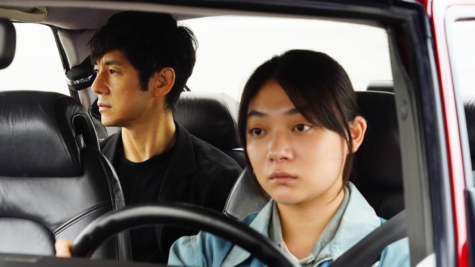
1. Drive My Car
Director: Ryusuke Hamaguchi
Country: Japan
“Drive My Car” is simply marvelous. A three hour epic of subtle intimacy that tackles love, loss, Chekhov, and the sad truth that you can never truly know someone, “Drive My Car” is the best film that’s been released in a long time, not just 2021. The film follows Yusuke Kafuku, a stage director putting on a multilingual performance of “Uncle Vanya” (1898) and still reeling from the sudden death of his wife as he starts to form a bond with the woman who drives him. The brilliance of the film comes mainly through conversation. Characters banter, philosophize, and pour out their hearts in subtly acted dialogues and monologues, all while a passive camera watches from a comfortable distance, never over-dramatizing the action. Much like Kafuku’s style of directing, much of the beauty and subtext come from a close reading of the film as opposed to having it all shown to you at once. While the acting is obviously impressive all around, it’s internalized enough that you have to really open yourself up to the film to appreciate it on a fuller level. This also goes for the visuals. The film has a painterly beauty to its cinematography that pairs perfectly with its methodical pace. As two characters go on a long car ride, the camera languidly follows the car from afar, echoing the cinematographic style of Abbas Kiarostami, another similarly subtle filmmaker. This restraint creates an atmosphere where something as small as the sharing of a cigarette or even a camera movement can sincerely move the audience where most films can’t do the same with more. While “Drive My Car” might have the most intimidating runtime of anything on this list, I assure you that it will suck you into its quietly dramatic world, and you won’t check your watch once. I implore you to see it.
5 Movies to Look Forward To in 2022
Since there’s limited information about any of these movies, I’ll keep it even briefer.
5. “Spider-Man: Across the Spider-Verse (Part One)”
Given that the first Spider-Verse film was a universally beloved masterpiece, it’s understandable that the new film would be something to anticipate. While I always have my suspicions about sequels, especially ones that follow great films with conclusive endings (note: “2010: The Year We Make Contact” (1984), “The Two Jakes” (1990), and “American Psycho II: All American Girl” (2002)), the trailer showed that if anything, the animation will still remain top-notch. Let’s just hope that increasing the scale of this one doesn’t turn Miles Morales into a figure as antithetical to Spider-Man as the MCU’s version of the character.
4. “The End”
Joshua Oppenheimer is, first and foremost, a documentarian, having directed two of the finest documentary films of the past decade: “The Act of Killing” (2012) and “The Look of Silence” (2014). These two excellent, harrowing films about the Indonesian Genocide might make it hard to believe that Oppenheimer’s next film is a musical, of all things. Inspired by the works of Jacques Demy and featuring Tilda Swinton, Stephen Graham, and George MacKay, “The End” promises to be, at the very least, an entertaining romp about the last family in the world after an apocalypse.
3. “Pinocchio”
It seems fitting that Guillermo del Toro, a maker of modern day adult fairy tales, will be taking a swing at one of the most classic fairy tales of them all. Del Toro’s filmography is excellent, and the stop-motion animation featured in the teaser is excellent, so hopefully his tale of a wooden boy in Mussolini’s Italy will spark the magic that it promises to.
2. “Three Thousand Years of Longing”
Not too much is known about George Miller’s first feature film since his magnum opus “Mad Max: Fury Road” (2015), but the premise is certainly intriguing. Idris Elba and Tilda Swinton play opposite to each other in a strange romance between a British academic (Swinton) and a Djinn she releases from a bottle (Elba). Miller promises that there will be some action scenes, but that this film will be the “anti-Mad Max”, which has me intrigued enough to put it on this list.
1. “Killers of the Flower Moon”
It’s not a controversial statement to say that Martin Scorsese is one of the finest filmmakers working today. His range, talent, and impressive body of work since the 70s have made it so that I’m always curious about whatever he’s releasing in a given year. What makes this film extra intriguing is that Marty’s two loves, Leonardo DiCaprio and Robert De Niro, are finally going to star in the same film, which has shockingly not happened before, considering Leo and Bob have been in Scorsese’s films since the early 2000s and the early 70s respectively. The book this film is based on also encourages some optimism, and I hope to be impressed yet again later this year when “Killers of the Flower Moon” is released.

